Dr. Wendy Maddocks (Nurse Academic, Amateur Historian, Christchurch, New Zealand www.doctorwendy.net)
In my research about the Swedes who fell at the Western Front in the Great War I have some Swedish born soldiers who emigrated to New Zealand. Dr Wendy Maddocks discovered the soldier Oscar Backman here on my web page, and through our normal contact she told me that she came really interested in his fate and she immidiately saw the possibiliy to fill the gap and extend the basic story and files I have found so far, into a really interesting and strong article about Oscars´s life in his new country. I am very happy to give you the full story, as far as we know up to this date, and, at the same time, some other very interesting facts within Wendy´s area of interest. /Joacim
Through following the posts by Jocke Hallberg about Swedes who fell in the Great War, I am interested in any New Zealand based Swedes when they crop up in his research. As a New Zealander, I have been researching the NZ nurses who served in WW1. My interest was piqued by one Pvt Oscar Backman, mentioned by Jocke, who hailed from a smallish town (Greymouth) in New Zealand, near where two of the WW1 nurses who perished in the sinking of the Marquette originated. The whole notion of ‘falling’ in war implies a degree of passiveness by the fallen and the subsequent feelings of sadness of the futility associated with this supposedly heroic act.
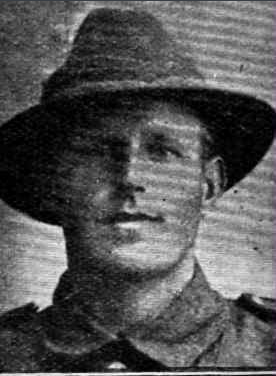
All the details of people who served in WW1 in New Zealand are digitally available via the Archives New Zealand online portal. To search you only need a name, so as I had some spare time I popped the name Oscar Backman in the database, initially out of idle curiosity. However, after a very quick read of his military file I learned that he had not heroically ‘fallen’, rather he had taken an extreme measure to kill himself.
This then opened up a flood of questions in my mind. As a current health professional and as mentioned, interested in the nursing aspect of WW1, I immediately posed some questions to myself and to Jocke. What was already known? What could have led to this tragic end of a life? What was done about it? Did his wife and parents know this detail? if not when would they have known? What was his background? Many more questions also came to mind and I must admit I felt a bit voyeuristic wanting to retrospectively inspect this man’s life and death. It’s only natural to immediately think that some sort of extreme mental trauma must have occurred and feel a measure of sympathy for such a person and their family. I decided to do some digging to try and virtually ‘meet’ this man some more and perhaps to try and find some context for his dramatic death.
Oscar was born in Sweden 2 July 1887, in the small village of Bjuv, Skåne, Swede, and travelled to New Zealand via Australia aged around 12, arriving in Australia 1900 with his parents (Nils Persson and Hanna Andersson and siblings).



His father had applied for naturalisation in Australia sometime around 1904 and later in New Zealand from 1907. This was a lengthy process, as naturalisation was not granted until 25 March 1913, and the online records show 34 pages of correspondence about this. The exact date of arrival of the family into New Zealand is yet to be determined. Oscar lived with his family in the small, but important West Coast town of Greymouth in the South Island.
Greymouth is on the river Grey (named after Governor Grey in the 1860s), and is a coastal town, built on the backbone of coal mining, forestry (felling of the dense native forests to build houses for the burgeoning British Colony) and later farming the cleared land. It is nestled between the rugged Tasman sea and the spectacular densely forested mountain ranges. This geography means the area has very high rainfall and to this day there is a distinctive misty mystique about being in the lush New Zealand bush. Beneath the hills there were seams of coal and gold.
For Māori it was an important area for pounamu (greenstone) found in the expansive rivers as well as an important place for trading. It also had a period of time in the 1860s-1880s of being a moderately successful gold mining area. It was initially called Blaketown and that name was used in some of the earlier correspondence of Nils Persson Backman, Oscar’s father. Modern day tourists can visit ‘Shanty Town’ to see what life was like back in the gold mining days.
The West Coast of the South Island attracted hardy types, hoping to get a living from mining or working in the forestry industry. At the time the Backman family arrived there would have been plenty of work for fit men such as Nils and certainly job prospects for an up and coming young man like Oscar. Transport to main centres would be by a cart track over the Southern Alps via Arthurs Pass to Christchurch or by boat to Wellington.
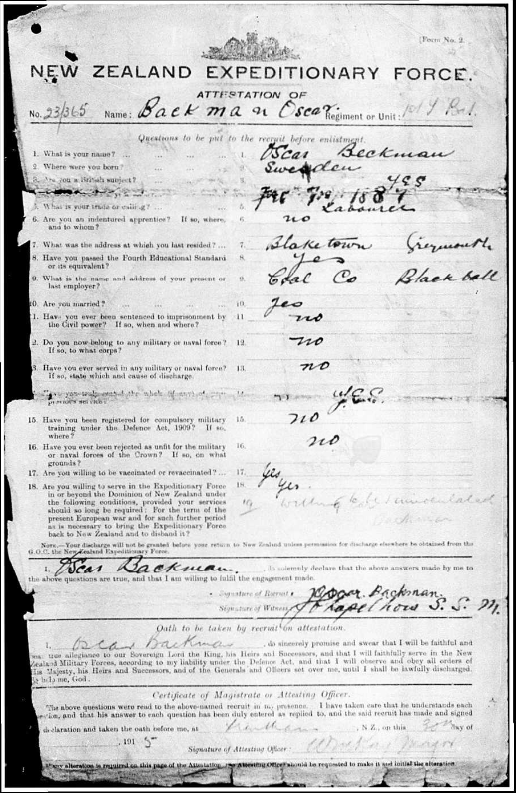
By the time Oscar signed up for service and embarked 25 December 1915 bound for Alexandria, Egypt he was married, 30 years old and father of two (possibly) three children. However, from various online sources it has become clear his life was not straightforward.
He married a local girl from Greymouth, called Florence Susan Dunning Swift (date of marriage unknown). Before he left for service, he possibly had three children, Pearl b. 1911, Edna. b. 1913 and Reginald b. 1915. However, the online cenotaph has Reginald’s birthdate as 3/01/1917. Neither date could be verified elsewhere and if it is the later this adds another layer of complexity as he could not have been Oscar’s child. The earlier date was obtained from Ancestry, which may also not be accurate. His service records are not available and tragically Reginald was killed in action in Cassino in 1944.


In January 1910 the local newspaper reported that Oscar’s house had burnt to the ground in Dunollie, which was a small settlement about 8km from Greymouth. It served the railway line built for the transport of coal. The paper reports that the “inmates barely had time to escape in their night clothes”. Oscar was reported to have lost £20 worth of possession including a valuable cornet and £5 in cash (a significant sum of money).
The fire was reported to have been started by a spark from an unattended fire. I don’t believe he was married then, as if he was, the newspaper would likely have mentioned his wife rather than the term ‘inmates’ (this term does not necessarily mean prison inmates. At this time could have been any group of people who lived together and weren’t a family, for example a working gang of labourers).
Oscar was no stranger to the wrong side of the law. In 1913 he was arrested and sentenced to 14 days in prison to be served in Auckland (a long way away in the North Island so this is a little unusual as there was a ‘gaol’ in Greymouth, but possibly may have been full. However the effort to get him to Auckland would have been significant at that time ). His crimes included drunkenness, defaulting in fines and in breach of his prohibition order (he was married by then with two young children). The fines appear to have been imposed in 1912 for the sum of £6 (reason unknown).
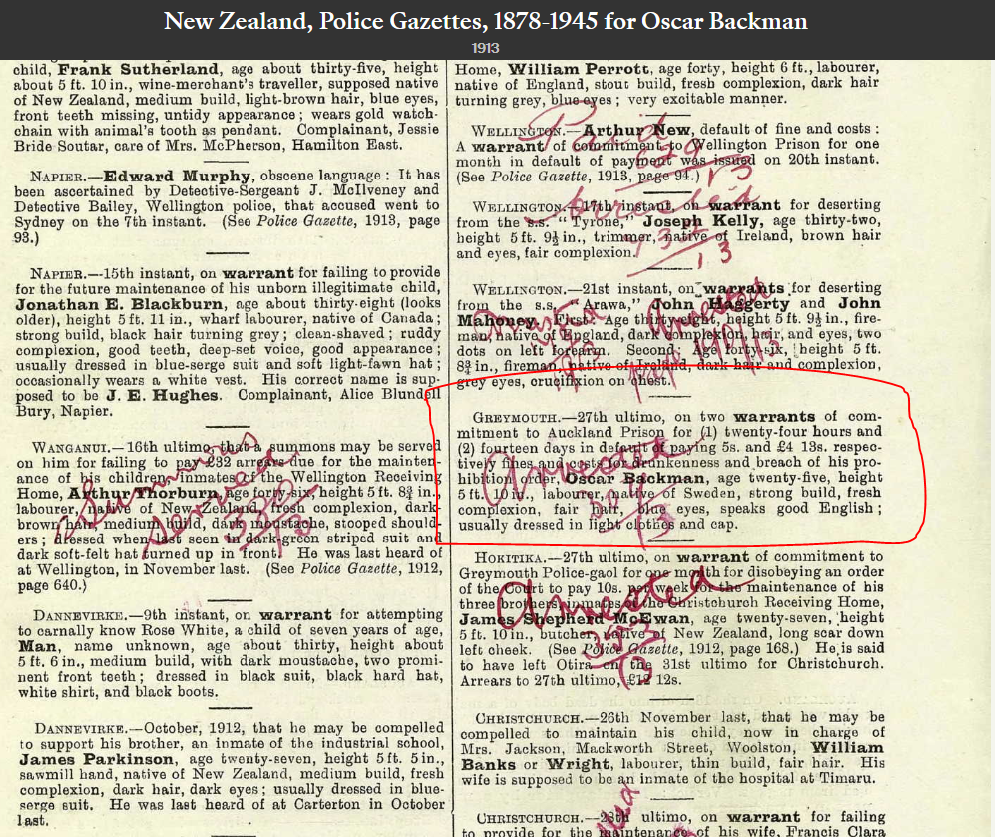
By 23 March 1915, life was not much better for his wife Florence, as Oscar was before the courts for “persistent cruelty to his wife and failure to provide adequate means to support her and his family.” A reasonable support payment was ordered and his wife had also asked to be separated from him and to take custody of the two children (no mention of a possible third child at this point). Sadly however it seems the support payments were not forthcoming as Florence herself was before the Grey Magistrate courts with outstanding rent due and was given notice of four weeks to move out and required to pay outstanding rent. No mention was made of Oscar at this point in the court records. Prior to his service his job was listed as being a warder.
By the time Oscar enlisted (mid 1915), his wife was listed as next of kin on his army records and they were now living in Wellington (this would have been a journey by sea or horse and cart to Christchurch and an overnight ferry). One possible explanation for this was they moved there when he enlisted as was undertaking his training at Trentham Camp, or more likely it was to get away again from mounting debts. Even before he left NZ, Oscar was in trouble with the army, being absent without leave. This happened at least four times during his service both in NZ and overseas, and each time he was docked days of pay probably punishing his wife and children more than him. He was also ordered to do 28 days of ‘KP’ (punishment) whilst in France in between two stints of being AWOL. One can sense the frustration of his commanding officer in his file.
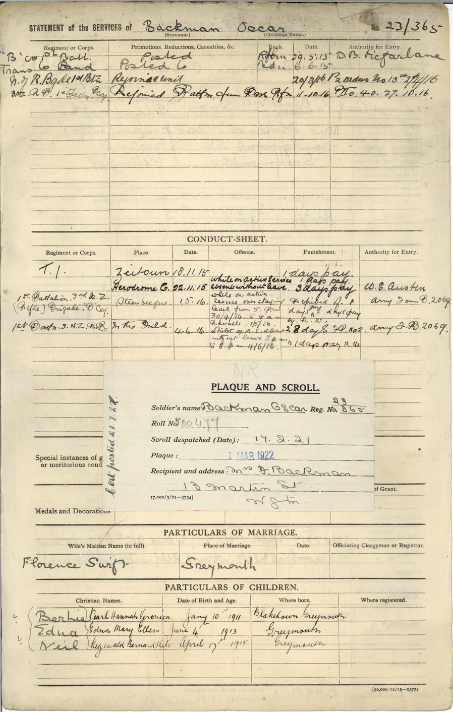


In addition to his regular stints of AWOL in France he was admitted several times for treatment of venereal disease, lasting months at a time. He possibly may have picked this up in Egypt earlier or maybe during his periods of AWOL in France. Venereal disease was a huge problem for the armed forces, as it rendered the men unable to fight for long periods of time. Finally in 1917 the NZ government provided men with preventative measures developed by the trail blazing Ettie Rout.
His final treatment seems to have been in October 1916 and his records then tell us he was admitted “sick” to No 3 Field Hospital on the 23 June 1917 (France). His records don’t say what the sickness was but he was being watched (guarded) by two medical orderlies so this suggests something serious (I started wondering at this point whether the birth of Reginald had actually happened in 1917 and hearing of this could have been enough to push him over the edge in some way). A short time later (hours after admission), we see in his files written in red, “he slit his throat with a razor”. It was severe enough to expose his trachea and oesophagus and he died in a pool of blood a few minutes later in front of the orderlies who tried in vain to save his life (for example, they lay him on his left side).
Based on this description it is most likely to be an aptly named ‘cut throat razor’, rather than a ‘safety razor’. There was a court of inquiry immediately and the findings were that he took his own life. This information was really confronting to read this and it has played on my mind- was it battle fatigue, also known as shell shock (what we now know and accept as post traumatic stress), had his repeated venereal disease affected his brain in some way, was there some other undiagnosed mental illness…? Much to ponder and discuss.
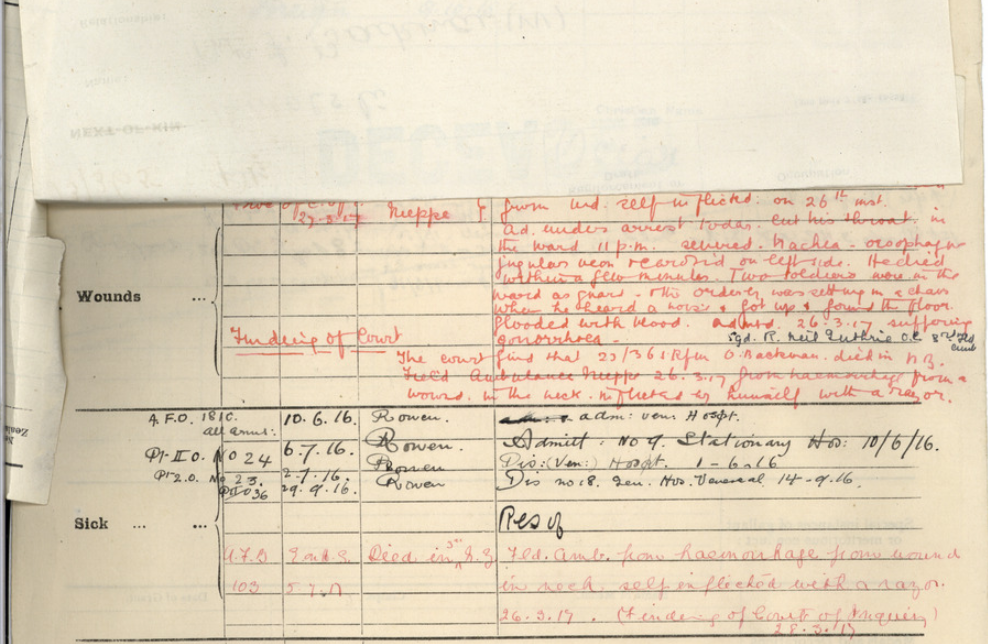
His death was widely reported back in NZ as being as a result of “sickness” with his wife noted as his widow. She had moved back to 30 Hospital Street in Greymouth* (presumably to be near her own family and his for the duration of the war). Despite his past shortcomings it seems he was a valuable member of the ‘Citizens Band’ (hence the grief at the loss of the Cornet in 1910) as a memorial service and parade was held for him 1917 in his honour with his band mates playing several songs and the national anthem. The conductor took Oscar’s place and played the cornet. One report of this concert notes he was “killed in France” (as opposed to being of “sickness”).


So who was Oscar the man? He was convicted of cruelty to his wife, was a drunk, maybe an arsonist, was in debt, spent a lot of time receiving treatment for venereal disease (gonorrhoea), and something led him to kill himself in the most violent and gruesome way in front of people. I wonder how much his wife and family knew of what happened- the reporting of his death as sickness appears to be a result of military propaganda (and possibly as a respect for his wife). He was posthumously given the war medals he was entitled to for his service and buried in a military cemetery so there was no suggestion from the military that he didn’t deserve official recognition of his service.
I wonder what the impact was for his mates, the people who provided medical care (especially those two orderlies), the impact on his children who would have had no memory of him at all, and his wife. We get a slight glimpse of him through a photo on the war memorial with a smile suggesting a hint of cheekiness and a strong chin. He looks like a handsome young man. In contrast, the photo of his son bares little resemblance to him, or is that just conjecture on my part? As well as Oscar’s parents and siblings, it is Florence I feel the most for; did she grieve this man who was cruel and mean, whom she had tried to separate from and what then became of her life? Nils Persson, Oscar’s father died in 1929- was Florence still close to that family at that time? There is no mention of Oscar’s family in the will of Nils, however he did have a surviving wife. For a family who had moved as far as possible to the other side of world from Sweden and built a new life, and fought the authorities to become naturalised New Zealanders, the grief must have been immense- did they know of his history of violence to his wife or the sorry state of finances?
Florence then went on to lose her son at Cassino in WW2. The online footprint from this time is very small, and the fact that Oscar was mentioned several times in the newspapers is interesting in itself. To answer other questions I would need to acquire the files of his son Reginald to confirm his date of birth.
This would at least solve one part of this mystery, or perhaps offer something in the way of a possible explanation for the extreme reaction of Oscar. In addition, the online file of Oscar may not contain all the information about him. The rest would have to be viewed in person by arrangement at the NZDF Archives in Trentham. Finding out more information about Florence, his wife would possibly not be too hard as she came from a small community.
For Oscar to volunteer for service and to choose to leave his wife and children before the compulsory conscription came in 1916 suggests a desire to leave his present life and responsibilities (and most likely debts) to go as far away as possible. War offered the ideal way for him to escape whatever was not right in his life. Whilst it is not appropriate to apply 21st century morals and values however, I am not sure I would have wanted to meet Oscar.
From a nursing point of view he sounded an unrepentant patient, with his repeat admissions. Despite this, whatever demons he had may he rest in peace at his grave site in France.
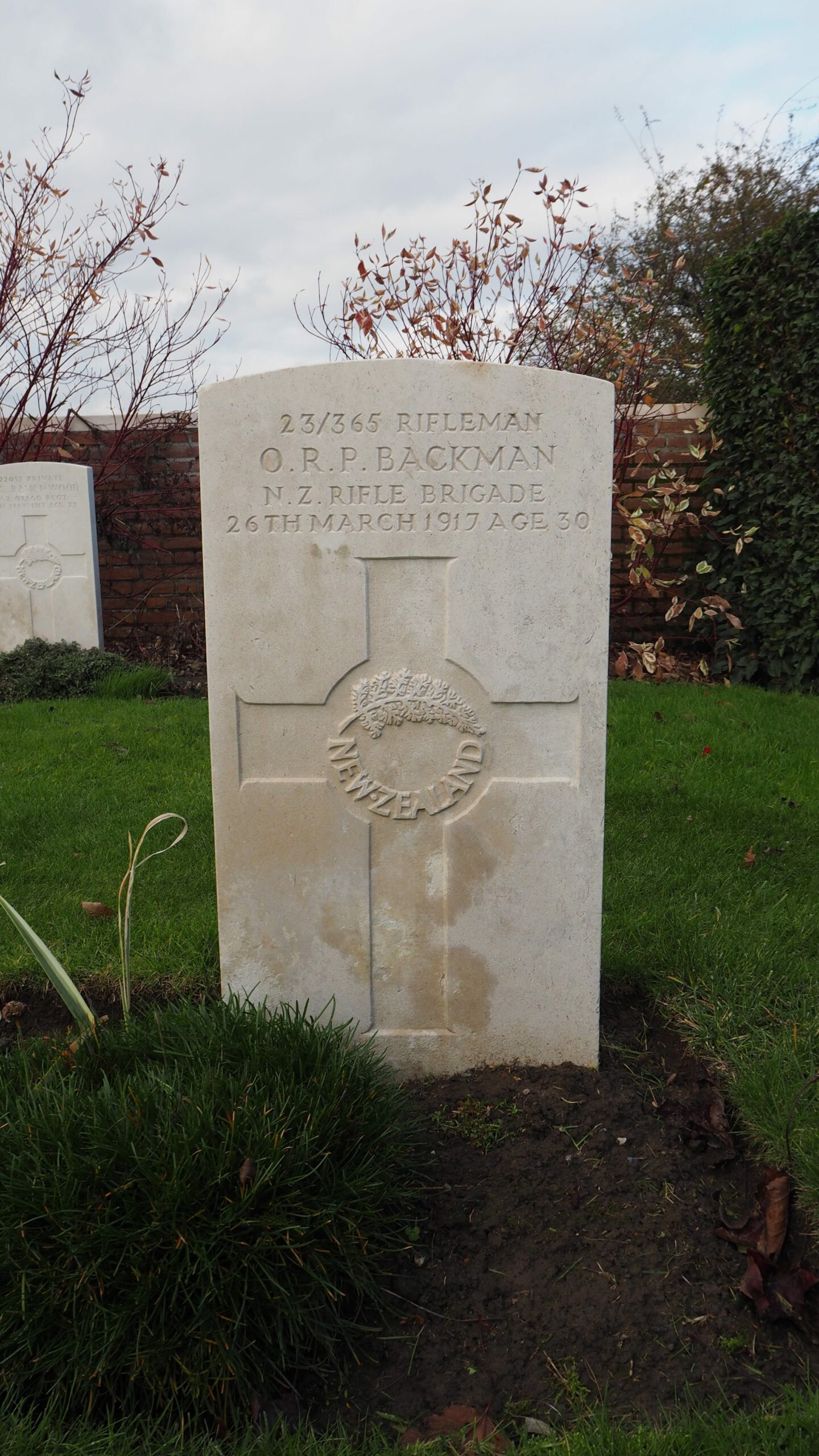
Post Script
Whilst not directly related to Jocke’s topic of Swedes Who Fell I still felt I needed some more context as to what Oscar did to himself. Please note this deals with the topic of suicide and this may be difficult to read about. Discretion is advised and if this causes distress please seek help.
The amazing work by Anna Rogers in the book ‘With Them Through Hell New Zealand Medical Services in the First World War” (Massey University Press, NZ) contains several incidences summarised here of WW1 service people who committed suicide whilst serving. Sadly of course many more died this way after the war. Whilst ‘shell shock’ was nominally recognised it was poorly understood, poorly managed, and in some cases sufferers ridiculed by their peers.
P. 236 “Crowther Garside..who had cut his throat on 12 July..severed trachea just above the larynx”. He is recorded as suffering a skin disease and broken sleep and suffered ‘temporary insanity’ (his wife had been granted a divorce in 1913).
P. 263 Charles Ward dentist, worked in Samoa and then England and developed trench mouth in 1917. Wrote a letter to his wife stating his intention to commit suicide- rode off on his bike and never returned, declared dead a year later (never found).
P. 353 It was noted that some men should never have enlisted and their mental and emotional stability was not honestly stated (I suspect Oscar would have fitted this description). Pvt Dan Bardsley was found on Feb 5, 1915 in the Egyptian desert with jagged wounds to his throat which he survived but was diagnosed with suicidal and homicidal tendancies which had been present since he ws aged 11. He was sent back to NZ under guard when he jumped off the ship ‘Tahiti’. On hearing the news his mother also committed suicide.
Sources.
- Papers Past is a searchable online database of all newspapers, journals in New Zealand up until 1961
- The individual Archive file of Oscar Backman
- Additional information about the family obtained via Ancestry and the Auckland War Memorial Cenotaph https://www.aucklandmuseum.com/war-memorial/online-cenotaph
*NotesHospital Street was renamed Guiness street at a later time. It was a typical main street of small town New Zealand of the time. This is a photo of Hospital Street circa 1900-1910 which gives a sense of the style of the buildings. The street is not sealed in this photo. The whole area was (and is) prone to flooding. Hospital Street, Greymouth. ca.1900-1910. | West Coast New Zealand History
Remarks by Joacim.
On Ancestry I many times stumble over information that is not correct, as in this case below, about some other individuals connected to this Oscar Backman, but they are not his parents at all. (Underlined in red) It reflects the risk of solely rely on single sources sometimes, and in my own start of the research about Oscar Backman, I directly found out that the information did not correlate with the correct info found in the Swedish church books, which is also connected to the correct facts given on the page about Oscar at CWGC. I found the correct page in the church book which also fits with all other fact so far about the family and their trip to Australia in 1899. Below I attach the facts from the wrong page in the church book, and from the correct one.



End of remarks.

Add: the Backman family may only have arrived in NZ as late as 1905/06 as in the naturalisation papers Nils Backman states in a 1909 letter they had lived in the ‘Dominion’ (New Zealand) for the last three years. Further work looking at shipping lists would be needed to confirm this.
Florence Backman, Oscars widow later remarried and and became Florence Brennan. At the time of her son Reginald’s death in WW2, a grandmother placed a notice in the papers, along with other family members however we don’t know whether this was from Oscar’s mother or Florence’s mother. In addition the newspaper reports that Reginald died as a result of an accident.